Table of Contents
Introduction
Chitrak (Plumbago zeylanica) is a medicinal herb belonging to the family Plumbaginaceae. Due to its medicinal properties, it is grown in most parts of India, majorly in West Bengal and the southern regions. It is also distributed worldwide in tropical and subtropical countries.1
The root is the plant part that contains many of its bioactive components responsible for most of its therapeutic properties. Plumbagin, a naphthoquinone, is a major component present in the root, which is responsible for its therapeutic activity.2
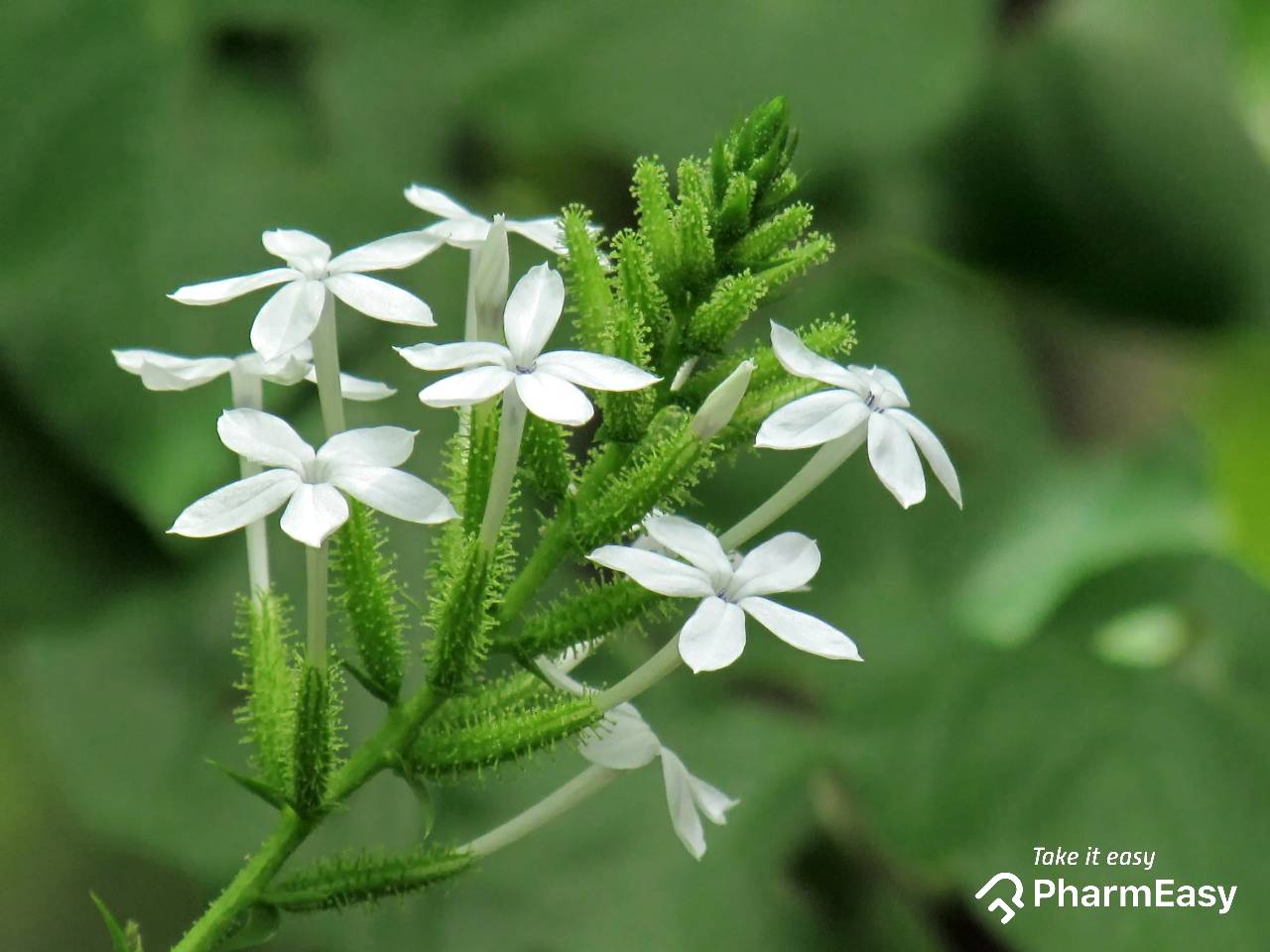
Other names of Chitrak include Agni/Vahni in Sanskrit, Chira/Chitra in Hindi, and Lead war in English.3 Plumbago zeylanica contains a variety of phytochemicals present in different parts. These phytochemicals are flavanoids, alkaloids, glycosides, steroids, triterpenoids, tannins, coumarins, phenolic compounds, saponins, naphthoquinones, carbohydrates, fixed oil and fats, and proteins.4
Nutritional Value of Chitrak:
The nutritional value of Chitrak extract in (mg/grams) is given below.1
- Protein: 42
- Starch: 45
- Sugar: 55
- Lipids: 41
- Phenol: 3
Therapeutic Uses of Chitrak:
The therapeutic uses of Chitrak are as follows:
- In Ayurveda, the roots are used to treat migraine, jaundice, skin diseases, urinary calculi, seminal weakness, and internal abscesses. It is also used as a detoxicant, febrifuge, antiseptic, and antihelminthic.5,6
- The root is used extensively in India and China to treat contusion of extremities, cancer, rheumatoid arthritis, and dysmenorrhea.1
- The roots contain an alkaloid called plumbagin. It is responsible for various therapeutic properties like antioxidant, antimalarial, antibiotic, antifertility, anticancer, and cardiotonic.1
According to certain research, Chitrak might be useful in the management of skin diseases like vitiligo.
Dr. Siddharth Gupta, B.A.M.S, M.D (Ayu)
Benefits of Chitrak:
1. Benefits of Chitrak in Kidney Disorders
- The extract of Chitrak can produce a reversal of kidney damage due to cisplatin.
- Chitrak extract showed protective activity against the nephrotoxic effects of the drug cisplatin.5
Also Read: 8 Home Remedies for Kidney Stones
2. Benefits of Chitrak in Cancer Prevention
- Plumbagin inhibits the growth of pancreatic cancer cells.
- It has the potential to provide therapeutic effects against pancreatic cancer.7
3. Benefits of Chitrak for Heart
- According to an animal study, the root extract of Plumbago zeylanica reduced the blood cholesterol level and low-density lipoproteins (LDL).
- Plumbagin also prevents cholesterol and LDL accumulation in blood vessels and the liver.8
4. Benefits of Chitrak in Wound Healing
- The wound-healing property of the root extract of Plumbago zeylanica has been reported in many preclinical evaluations.
- The wound-healing activity is due to phytochemicals like saponins, flavonoids, alkaloids, and terpenoids.
- The antioxidant nature of the plant extract is also said to be responsible for wound healing activity.8
5. Benefits of Chitrak in Preventing Liver Damage
The root extract of Plumbago zeylanica showed protective benefits against paracetamol-induced hepatic damage in an animal model.9
Also Read: 7 Signs of Liver Stress
6. Benefits of Chitrak in Treating Microbial Infections
- According to a study, the root extract of Plumbago zeylanica showed antibacterial activity against several bacteria like Staphylococcus aureus, multi-resistant strains of E. coli and Shigella, Bacillus subtilis, Salmonella typhi, Pseudomonas aeruginosa.
- The crude extract of leaves showed antimicrobial activity against E.coli, Bacillus cereus, Staphylococcus aureus, and Candida.8
7. Benefits of Chitrak in Managing Arthritis
- According to an animal study, the root extract of Plumbago zeylanica could suppress collagen type 2-induced arthritis.
- The application of root extract could alleviate the symptoms of arthritis.10
8. Benefits of Chitrak in Birth Control
- Boiled aqueous extract of the root is used for fertility control.2
- The leaf extract of Plumbago zeylanica also showed antifertility action in rabbits.
- This antifertility action is reversible once the treatment with the extract is discontinued.11
Also Read: Gokshura – Uses, Benefits, Side Effects & Precautions
As we know, obesity can lead to many systemic health conditions. In Ayurveda, herbal drugs like Chitrak and Haridra might be beneficial for the management of weight as they might potentially reduce hyperlipidaemia.
Dr. Rajeev Singh, BAMS
How to Use Chitrak?
Chitrak can be applied externally as a paste and can be administered orally as well. There are various marketed dosages available that contain Chitrak.12 Your Ayurvedic physician will prescribe you the form and dosage as per your health condition.
Side Effects of Chitrak:
The side effects of Chitrak are as follows:
- Plumbagin, found in the root extract of Plumbago zeylanica, produces abdominal colicky pain and irritation when administered in high doses. Other symptoms include redness and itching of the skin, dilated pupils, myotonia, hypotonia, irregular pulse and respiratory failure.
- Roots or twigs, when applied externally, cause skin redness and blisters.4
Also Read: Castor Oil – Uses, Benefits & Precautions
Precautions to Take With Chitrak:
You should keep the following points in mind:
Dietary Precaution
Avoid oily foods, spices, and condiments to ensure good absorption of Chitrak. Root vegetables like potatoes and tubers should be avoided to facilitate good absorption of Chitrak. It is advised to drink plenty of water in between meals and while taking the plant drug to ensure good absorption, bioavailability, and excretion of the plant drug.13
Precautions to be taken in Pregnancy
It should be avoided in all stages of pregnancy, as it possesses antifertility activity. It has antiovulatory effects.11
Also Read: Ber Fruit – Uses, Benefits & Side Effects
Frequently Asked Questions (FAQs)
Chitrak (Plumbago zeylanica) is a medicinal herb belonging to the Plumbaginaceae family.1
Other names of Chitrak include Agni/Vahni in Sanskrit, Lead war in English, and Chira/Chitra in Hindi.3
In Ayurveda, the roots are used to treat migraine, jaundice, urinary calculi, skin diseases, internal abscesses, and seminal weakness. It is also used as a detoxicant, antiseptic, febrifuge, and anthelmintic. 5,6 Its root has various therapeutic characteristics like antioxidant, antimalarial, antifertility, antibiotic, and anticancer.1
Chitrak has benefits in kidney disorders5, heart disorders8, liver damage9, arthritis10, birth control11, microbial infection8, wound healing8 and cancer7.
The extract of leaves and roots can be administered orally to alleviate arthritic pain and aid in digestion. The paste of the whole plant can be applied externally on the skin for treating skin diseases. Citrakadi gutika, a product containing Chitrak, is used to cure diarrhoea associated with chronic colitis and abdominal pain.12 Other formulations of Chitrak are Chitraka hareetakki, Citrakadi Churna and Chitrakadi Vati.3
Oily foods, spices, condiments, and root vegetables like potatoes and tubers should be avoided to ensure good absorption of Chitrak. It is advised to drink plenty of water in between meals and while taking the plant drug to ensure good absorption, bioavailability, and excretion of the drug.13 Chitrak should be avoided in all stages of pregnancy, as it possesses antifertility activity. It has antiovulatory effects.11
Plumbagin, found in the root extract of Plumbago zeylanica, produces abdominal pain and irritation when administered in high doses. Other symptoms include redness and itching of the skin, dilated pupils, myotonia, hypotonia, irregular pulse and respiratory failure.4 Roots or twigs, when applied externally, may cause skin redness.4
It should be avoided in all stages of pregnancy, as it has antifertility and antiovulatory effects.11
Also Read: Kaunch Beej – Uses, Benefits, Side Effects & Precautions
References:
- (PDF) Antioxidant activity and phytochemical evaluation of Plumbago zeylanica Linn. in vivo and in vitro [Internet]. [cited 2022 Feb 8]. Available from: https://www.researchgate.net/publication/230788848_Antioxidant_activity_and_phytochemical_evaluation_of_Plumbago_zeylanica_Linn_in_vivo_and_in_vitro
- Tilak JC, Adhikari S, Devasagayam TPA. Antioxidant properties of Plumbago zeylanica, an Indian medicinal plant and its active ingredient, plumbagin. Redox report : communications in free radical research [Internet]. 2004 [cited 2022 Feb 8];9(4):219–27. Available from: https://pubmed.ncbi.nlm.nih.gov/15479566/
- Arya N, Sharma A. THE THERAPEUTIC AND TOXICOLOGICAL EFFECT OF CHITRAK (PLUMBAGO ZEYLANICA L.)- A REVIEW. AYUSHDHARA [Internet]. 2015 Dec 8 [cited 2022 Feb 9];2(4). Available from: https://ayushdhara.in/index.php/ayushdhara/article/view/78
- Chen CA, Chang HH, Kao CY, Tsai TH, Chen YJ. Plumbagin, isolated from Plumbago zeylanica, induces cell death through apoptosis in human pancreatic cancer cells. Pancreatology : official journal of the International Association of Pancreatology (IAP) . [et al] [Internet]. 2009 [cited 2022 Feb 8];9(6):797–809. Available from: https://pubmed.ncbi.nlm.nih.gov/20110748/
- (PDF) A review on multi-purpose medicinal plant Plumbago zeylanica and in-vitro production of plumbagin [Internet]. [cited 2022 Feb 8]. Available from: https://www.researchgate.net/publication/315379475_A_review_on_multi-purpose_medicinal_plant_Plumbago_zeylanica_and_in-vitro_production_of_plumbagin
- Hepatoprotective effect of Plumbago zeylanica on paracetamol induced liver toxicity in rats [Internet]. [cited 2022 Feb 8]. Available from: https://www.researchgate.net/publication/285011304_Hepatoprotective_effect_of_Plumbago_zeylanica_on_paracetamol_induced_liver_toxicity_in_rats
- Edwin S, Joshi SB, Jain DC. Antifertility activity of leaves of Plumbago zeylanica Linn. in female albino rats. http://dx.doi.org/101080/13625180902874310 [Internet]. 2009 [cited 2022 Feb 9];14(3):233–9. Available from: https://www.tandfonline.com/doi/abs/10.1080/13625180902874310
- Uses of Plumbago zeylanica L. | National Innovation Foundation-India [Internet]. [cited 2022 Feb 8]. Available from: https://nif.org.in/PLUMBAGO-ZEYLANICA-L
- (PDF) Pharmaceutical Studies and Therapeutic Uses of Plumbago Zeylanica L. Roots (Chitraka, Chitramulamu) [Internet]. [cited 2022 Feb 9]. Available from: https://www.researchgate.net/publication/215649528_Pharmaceutical_Studies_and_Therapeutic_Uses_of_Plumbago_Zeylanica_L_Roots_Chitraka_Chitramulamu
Read more about: 8 Nutritious Health Benefits of Sweet Lime
Disclaimer: The information provided here is for educational/awareness purposes only and is not intended to be a substitute for medical treatment by a healthcare professional and should not be relied upon to diagnose or treat any medical condition. The reader should consult a registered medical practitioner to determine the appropriateness of the information and before consuming any medication. PharmEasy does not provide any guarantee or warranty (express or implied) regarding the accuracy, adequacy, completeness, legality, reliability or usefulness of the information; and disclaims any liability arising thereof.
Links and product recommendations in the information provided here are advertisements of third-party products available on the website. PharmEasy does not make any representation on the accuracy or suitability of such products/services. Advertisements do not influence the editorial decisions or content. The information in this blog is subject to change without notice. The authors and administrators reserve the right to modify, add, or remove content without notification. It is your responsibility to review this disclaimer regularly for any changes.



 By
By 


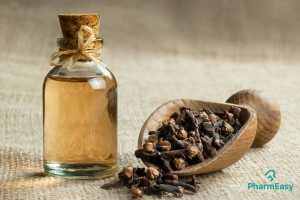
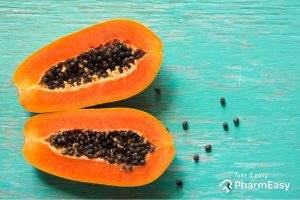


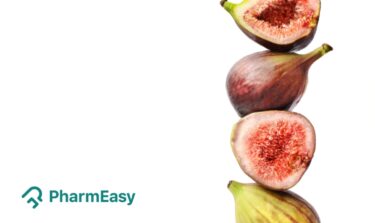

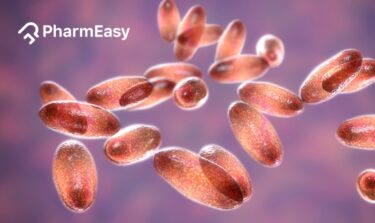


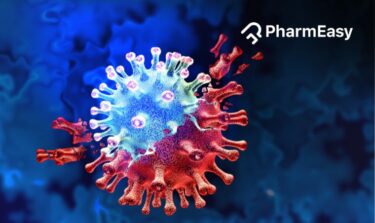



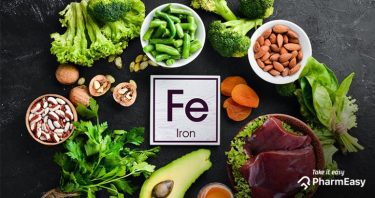





Comments